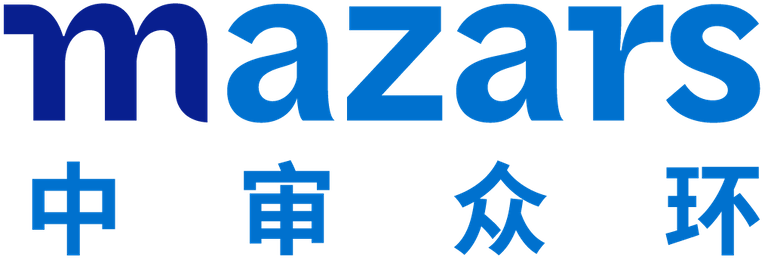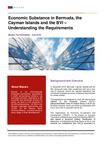
July 2019 - Economic Substance in Bermuda, the Cayman Islands and the BVI – Understanding the Requirements
July 2019 - Economic Substance in Bermuda, etc.
The legislations are designed to meet the requirements outlined by the European Union’s (“EU’s”) intergovernmental Code of Conduct Group (“CoCG”) on Business Taxation, which are aimed at jurisdictions with low or zero rate of corporate income tax.
Background and Overview
In December 2018, Bermuda, Cayman Islands and the BVI, along with many other jurisdictions with low or zero rate of corporate income tax, passed legislations that introduced increased economic substance requirements for certain entities.
The legislations are designed to meet the requirements outlined by the European Union’s (“EU’s”) intergovernmental Code of Conduct Group (“CoCG”) on Business Taxation, which are aimed at jurisdictions with low or zero rate of corporate income tax.
The Organization for Economic Co-operation and Development (“OECD”), in the project on Inclusive Framework on Base Erosion and Profit Shifting (“BEPS”), also issued a document entitled “Resumption of Application of Substantial Activities Factor to No or only Nominal Tax Jurisdictions” (the “OECD document”) in the respective local legislation is thus to address the attack from both fronts, the CoCG of EU and the OECD.
The new economic substance requirements in these low or zero rate tax jurisdictions may have significant impact on business groups with a Bermuda, Cayman Islands or BVI holding company in their corporate structures, as well as investment funds with a Bermuda, Cayman Islands or BVI fund manager.
In detail
1. What are the activities subject to the economic substance requirements?
The list of relevant activities was defined by the EU and as such is mostly consistent across all low or no tax jurisdictions. Relevant activities include the following:
- Banking
- Insurance
- Fund Management
- Financing
- Leasing
- Headquarters
- Shipping
- Distribution and service centres
- Intellectual property (“IP”) and
- Holding companies
If an entity’s activities are not included the above relevant activities, the requirement for economic substance would not apply. For example, if a BVI company is carrying on trading on stocks and securities, the economic substance requirement would not apply to this company, unless this company is providing fund management services.
2. What are the entities covered?
Broadly speaking, a relevant entity includes a company incorporated under the relevant Company Law, a partnership registered under the relevant Limited Liability Partnership Law and a company incorporated outside the relevant jurisdiction but registered under the Company Law of the no or low tax jurisdiction.
The definition excludes, amongst others, entity that is tax resident outside the relevant no or low tax Jurisdiction. In this regard, the entity must be subject to tax in the other jurisdiction, or if its branch is subject to tax on its relevant income in the other jurisdiction by reason of its domicile, residence or any other criteria of a similar nature, and is able to produce satisfactory evidence such as Tax Identification Number/Tax Resident Certificate/assessment or payment of tax to substantiate the same.
For example, a Cayman Islands holding company with its mind and management located in China can substantiate that it is a tax resident of China, such that it is not a “relevant entity” in Cayman Islands and the economic substance rule would not be applicable. Nevertheless it must be able to provide the above satisfactory evidence.
3. Substantial activities requirements for non-IP income:
Under CoCG, each of these no or low tax jurisdictions is required to have domestic legislation that:
(i) Defines the Core Income Generating Activities (“CIGA”) for each relevant business activity;
(ii) Ensures the CIGA relevant to the type of business activity is undertaken by the company or is undertaken in the jurisdiction;
(iii) Requires the company to have an adequate number of full-time qualified employees and incur an adequate amount of operating expenditures; and
(iv) Provides a transparent mechanism to ensure compliance and an effective enforcement mechanism for non-compliance with the requirements.
4. Substantial activities requirements for IP income:
The substance requirement for earning IP income is quite stringent. The rule also distinguishes between patent and marketing intangibles. The CIGA for income derived from patent and similar assets is defined as conducting R&D activities whereas the CIGA for income derived from marketing intangible such as trademarks is defined as branding, marketing and distribution activities.
In addition, if there are related parties involved, for example, acquiring an IP from a related party or licensing the use of an IP to a related party, there is a rebuttable presumption that the substantial activities requirements are not met in the absence of the CIGA mentioned above.
For example, if the company only passively holds an IP which had been created or exploited based on activities performed outside the jurisdiction, the company will be considered as not meeting the substantial activities requirement.
The CIGA for each of the above relevant activities, both in respect of IP and non-IP income, is summarized in Appendix 1 to this tax newsletter.
5. Compliance Mechanism:
As required by CoCG, a sanction mechanism would be in place so that actions can be taken for non-compliance with the substantial activities requirement. While each of the no or low tax jurisdictions may have different penalty actions, the mechanism generally composes of the following:
- Fine for non-compliance;
- Exchange of information with the competent authority of the company’s parent company and/or the relevant overseas tax resident jurisdiction; and
- Striking off of the company by court order if there is continuous non-compliance.
The summary relating to penalty actions of Bermuda, the Cayman Islands and the BVI respectively is set out in Appendix 2 to this tax newsletter.
6. Economic Substance Timelines:
The substantial requirement will be effective for all “new” companies on 1 January, 2019, whereas the effective date for all “existing” companies would be 1 July, 2019. However, the effective date for existing BVI company has been changed to 1 October, 2019.
A company located in the relevant no or low tax jurisdiction would be required to report to the relevant tax authority as to its compliance status at a date to be specified. It is expected that the due date for filing such a report would be 1 September of the following year.
7. Reduced Economic Substance Requirement for Pure Equity Holding Company:
The economic substance requirement is reduced for a pure equity holding company, which carries on no relevant activity other than holding equity participations in other entities, and earns only dividends and capital gains. Generally, it will only need to meet the following:
- Complies with the domestic statutory obligations under the Company Law or the Limited Partnership Act; and
- Has adequate employees and premises for holding equitable interests or shares, and where it manages these equitable interests or shares, has adequate employees and premises for carrying out the management functions.
8. Is Out-sourcing Permissible?
In general, non-CIGAs, e.g., back office functions, can be outsourced. With respect to CIGAs, outsourcing of the activities to local service providers is permissible if the relevant entity is able to monitor and control over the local people in carrying out the CIGAs in the relevant jurisdictions. Nevertheless, one must have to follow the relevant guidelines to ensure that the out-sourcing is permitted. In addition, it is uncertain as to whether the EU or the OECD has agreed to the outsourcing of CIGAs.
Implications
The economic substance requirements in no or low tax jurisdictions may have significant impact on a wide range of business, including:
- Listed group with BVI, Cayman Islands or Bermuda listing vehicle or multi-level of intermediate BVI/Bermuda/Cayman Islands investment holding companies;
- Private business group using multi-level of intermediate BVI/Bermuda/Cayman Islands investment holding companies to hold its equity investment or real estate property;
- Family trust using multi-level of intermediate BVI/Bermuda/Cayman Islands investment holding companies to hold the family trust’s equity investment or real estate property;
- A business group using a BVI/Bermuda/Cayman Islands company to hold an IP and earns royalty income from the IP, but which the functions in creating the IP are not being carried out in the no or low tax jurisdictions;
- A China parent company with a BVI/Cayman Islands subsidiary where the BVI/Cayman Islands subsidiary is managed and operated in China; and
- The fund industry
How We Can Help
Business groups should take immediate actions to review their existing holding or operating structures, assess if any BVI/Bermuda/Cayman Islands entities in the structure are subject to the economic substance requirement.
In the event either the economic substance requirement is not met, or it is not commercially desirable or feasible for these BVI/Bermuda/Cayman Islands entities to meet the economic substance requirements, the business group should consider options to explore. For example, it may be feasible to replace the BVI/Bermuda/Cayman Islands entity with a Hong Kong entity to hold the equity investment in subsidiaries or IP asset.
In this regard, if the structure involves subsidiaries in China, one would also need to be mindful of the Indirect Transfer Rule under Bulletin (2015) No. 7 issued by the PRC State Administration of Taxation. Besides, taxpayers in China should also be mindful that whether the PRC tax bureau would impose more restrictions on claiming royalty expenses such as the now defunct Bulletin (2015) 16
Mazars can assist in assessing the existing holding or operating structure and to explore options to deal with the circumstances.
Download our latest tax newsletter to explore more details and read Mazars' suggestions.




